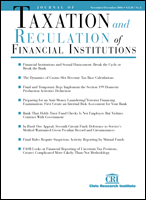Complete Issue
Author: Houman Shadab.
Source: Volume 29, Number 06, July/August 2016 , pp.1-52(52)

< previous article |return to table of contents
Abstract:
This issue begins with an article, by Philip Hirschfeld, on the structure and benefits of corporate inversions, as well as recent congressional reform efforts that reigned them in in the Spring of 2016. Inversions, undertaken by globally active corporations, are relevant to financial institutions, as Mr. Hirschfeld explains, due to the equity value of companies that engage in them, the debt covenants implicated by undertaking an inversion, and financial institutions’ need to understand whether any firms they are doing business with have been caught by recent wave of reform. Our second article, by Alan Avery, Lori Goodman, Stephen Wink, Brett Ackerman, Pia Naib, Jordan Salzman, and Bharath Mohan, discusses the Proposed Rule under Dodd-Frank Act Section 956 curtailing incentive compensation at financial institutions. The Proposed Rule, jointly issued, for a second time, in June 2016 by six federal financial regulatory authorities establishes a wide variety of limitations and prohibitions, and imposes new and complex governance and record-keeping requirements on covered financial institutions. Our next article addresses the risks global financial institutions face under U.S. law due to offshore account holders’ tax evasion. Authors Amy Carpenter-Holmes and Ken Gazzaway frame their discussion in terms of the recent Panama Papers scandal; they discuss a variety of potentially troublesome areas including compliance and relationships with non-transparent entities. As the authors point out, although these investigations primarily target individuals evading taxes, statutory regimes such as the Foreign Account Tax Compliance Act and retrospective investigative efforts by international enforcement agencies increasingly are tying financial institutions to their account holders’ misdeeds. And all too often it is the financial institution that bears the burden of proving that account holders are not evading taxes. John Barrie, in his State and Local tax column, discusses the recently proposed regulations under Section 385 for determining whether a related-party instrument is debt or equity for all federal tax purposes (proposed by the Internal Revenue Service on April 4, 2016). The proposed regulations, if finalized, would have a very broad impact--potentially applying to related debt instruments issued by financial institutions and any related entities. Although issued under the federal tax code and primarily targeting corporate inversions, the proposed regulations also could have significant adverse state income tax consequences to wholly domestic corporations, and could apply to common intercompany debt transactions. This issue concludes with a Regulation column reviewing the primary sources of policy, law, and practices regarding settlement finality in securities and derivatives transactions. The area has taken on a renewed importance in recent years, as the U.S. is seeking to reduce settlement times and technologies such as distributed ledgers cause a fundamental rethinking of the area.Keywords: inversion; Dodd-Frank Sec. 956; Panama Papers, FATCA Compliance; IRC Section 385; payment and settlement systems
Affiliations:
1: New York Law School.